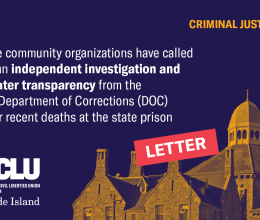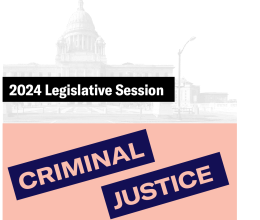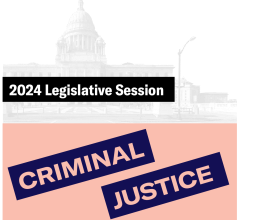The ACLU of Rhode Island and the Rhode Island Patient Advocacy Coalition today sharply criticized the state Department of Health for adopting new regulations governing the medical marijuana program that the groups say will greatly harm patients’ access to the program. If not revisited by the Department, the groups said they would seek legislative intervention to overturn the rules.
“RI residents suffering from serious debilitating medical conditions who have been successfully participating in the program will suddenly find themselves with new costs and requirements that may make their continued participation in the program less likely. The medical marijuana program is getting too expensive and burdensome for sick and disabled patients, some of whom are now considering giving up their legal status and relying on the illegal market,” said JoAnne Leppanen, executive director of RIPAC.
At a public hearing held last month, the two groups and individual participants in the program urged a number of revisions to the Department’s proposed regulations to avoid this scenario. However, the DOH made no changes before filing the rules for adoption on Friday.
Among the concerns that the ACLU and RIPAC had raised about the rules but that were ignored:
* Patients will be forced to pay for more doctor visits, as they will have to see their physician at least twice a year for an “assessment” in order to have their medical marijuana card renewed. The requirement applies to all patients, including those with incurable medical conditions who have been successfully medicating with cannabis since the program took effect ten years ago. The ACLU and RIPAC had argued that this new requirement was not only unnecessary for many patients, but that it puts a significant financial burden on them, and would be particularly onerous for poor patients and those with mobility issues. The licensing fee was also doubled for low-income patients, and the rules fail to incorporate a change in the law this year requiring fee waivers for hospice patients and their caregivers.
* Physicians will now be required to turn over to the DOH all “relevant” medical records that document the patient's medical condition authorizing their participation in the program. This would apply to all patients, including those who have been participating in the program for years. But the rules fail to define what constitute “relevant” medical records, don’t explain how the confidentiality of those records would be protected, and provide no guidance on how a DOH determination contrary to the physician’s could be appealed. The ACLU argued that these were important issues “that need to be answered before the Department begins receiving sensitive medical records of participating patients.”
* If a patient needs someone to pick their medicine up for them at a compassion center, they can appoint an “authorized purchaser” to do so, but that person must pay $135 in registration and background check fees to qualify. RIPAC director Leppanen said: “Charging someone a fee for being helpful and kind is insulting. This fee will have the most impact on those patients without transportation and the most disabled by making it more difficult for them to get the help they need.”
* The rules fail to address a major problem that the ACLU and RIPAC have encountered of employers denying jobs to medical marijuana patients who test positive for marijuana on drug tests, notwithstanding statutory language barring employment discrimination against medical marijuana cardholders.
* The rules now require caregivers to reside in Rhode Island. RIPAC director Leppanen noted: “We have Rhode Island caregivers who moved to Massachusetts but kept their commitment to their patients because their patients need them. The new regulations will sever those relationships.” In its testimony, the ACLU had noted that “Rhode Island is simply too small a state to impose such a restriction, as it needlessly limits the pool and availability of caregivers to patients who require one, particularly those who live near the Massachusetts and Connecticut borders.”
Rep. Scott Slater, a strong advocate of the medical marijuana program and son of the legislator who started it, joined in the groups’ criticism of the regulations. He said: “My father’s vision in legalizing medical marijuana was to provide compassion and safe access for patients suffering from debilitating medical conditions. The conversations about the program increasingly center around finances. The goal of the Health Department should be to welcome qualifying patients into the Program, not make it more difficult. Unfortunately, these regulations make it more difficult and send the patients that the Program was designed to protect to the unsafe illegal market and/or return them to less effective medicines, medicines with terrible side effects, and/or opiates that they may be addicted to.”
ACLU of RI executive Director Steven Brown added: “It is both ironic and deeply disturbing that, even as the legalization of the recreational use of marijuana in Rhode Island seems ever more likely, the state is putting completely unnecessary and burdensome obstacles in the way of those who need to use the drug for medicinal purposes. In a few years, it will probably be easier for a healthy millennial to legally purchase marijuana than for a sick patient to do so. That is nothing short of cruel.”
The ACLU and RIPAC’s written testimony to the DOH can be found here and here.




